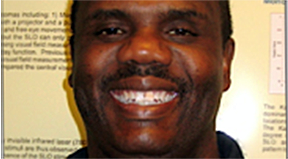Vincent

My name is Vincent. I have been using computers and computing systems to solve accessibility problems for more twenty years. I’m currently working towards my master’s degree in human computer interaction (HCI) at the Georgia Institute of Technology in Atlanta, GA. After I graduate I plan to attend a PhD program in human-centered computing.
HCI is a unique area in the computing field that studies the human perspective in the design and use of computing systems. When I started graduate school, I was considering studying engineering psychology, but two fellow students steered me towards HCI, which they thought was a better fit.
What I’ve enjoyed about graduate school is that I have the autonomy to study almost anything I want. I have enjoyed the conversations that I have had with the fellow graduate students in my lab and the classes that I have taken with others. Getting to know the other people that are in graduate school is what makes going to class and the lab every day a truly enjoyable experience.
Does your disability affect your education?
I am blind, with only light perception. I have a genetic eye disease called retinitis pigmentosa that started to affect me in my early teens. I was undiagnosed, until I self-diagnosed myself at the age of twenty-three. At school, I have to help my professors remember that I cannot see any board that they are writing on. Getting them to routinely vocalize what they write is the most difficult task in any class. I stay ahead in all my classes to help me better understand the lectures. I read ahead and then visit with professors before they cover a topic. There are several classes in some of the object-oriented programming languages that just are not accessible with screen reading programs. There are also several programming environments that have a lot of trouble working with screen readers as well.
To be successful, I utilize an enormous amount of assistive technology. I have an HIMS Braille Sense notetaker and a BrailleConnect Braille display, and I use the Freedom Scientific OpenBook Reading System for scanning documents. Most of all, I have five different screen reading programs. I use JAWS for Windows, Window-Eyes, HAL, Non-Visual Desktop, and System Access. I also have an Apple Mac-mini, iPad, and iPhone that all use the voice-over screen reading system.
Why did you decide to go to graduate school in human computer interaction?
I have already worked in a variety of computing positions. I have been an assistive technology instructor, where I taught assistive technology and computer skills to low-vision and blind students. I have also worked as a rehabilitation engineer for twenty years. In that capacity, I spent most of my time modifying computer systems to ensure that they interfaced properly with assistive technology. I also did programming in several of these positions.
The most recent job that I had as a research rehabilitation engineer and research scientist had me doing everything you could imagine that combined engineering, psychology, and computer science. I designed the interface for many devices that we created in our research projects. This is how I ended up choosing human computer interaction for the master’s portion of my graduate work. My supervisor at that job told me that in order to become a full investigator at the research facility, I would need to earn a PhD. Once I earn my PhD, I intend to return to my previous employer as a full researcher and principal investigator, but also have an appointment at a university. This will allow me to teach and to collaborate with other academics in the field.
What are you going to do with your degree?
The problems that I want to research are multi-disciplinary. I want to study the interface design of assistive technology, especially in a manner that will allow me to deliver as much content to as many people possible with the least number of resources. Specifically for the blind and visually impaired, I want to create systems of information output that convey information about science, technology, engineering, and math (STEM) to blind students and scientists more efficiently. I want to create a multi-modal input and output system that will allow for seamless integration of a person with a visual disability into any technical discipline.
Computing systems have allowed me to have a career and to solve a myriad of problems—most importantly allowing me to access information and increase my ability to communicate. I have also gained the skills to give people with visual impairments the tools that they need to navigate the visual world by applying technical and computing technology in the right manner.
What can I do while I’m in high school if I want to pursue a career in computing?
If you’re thinking about a career in computing, make sure you are ready for the rigors associated with any STEM field. This means that you should be ready to think logically and apply mathematical reasoning in all aspects of your technical area. You should also have a diverse background, by pursuing interests in fields such as social sciences and humanities. Computing is closely related to human behavior, so an understanding of psychology and sociology is a must.
What traits are important for computing students?
Discipline, discipline, and discipline! Perseverance solves problems with computing systems. The answer rarely just pops into your head or is just sitting in front of you. You may have to think abstractly or try many different methods to get the answer to a particular problem.
Why should I study computing?
Computing is a fascinating field to get into. The sky is the limit! There is always a position in the computing field for anyone who has gained the education and skills necessary. Since very few people actually understand how computers work, you will always be revered, because you “know computers.”